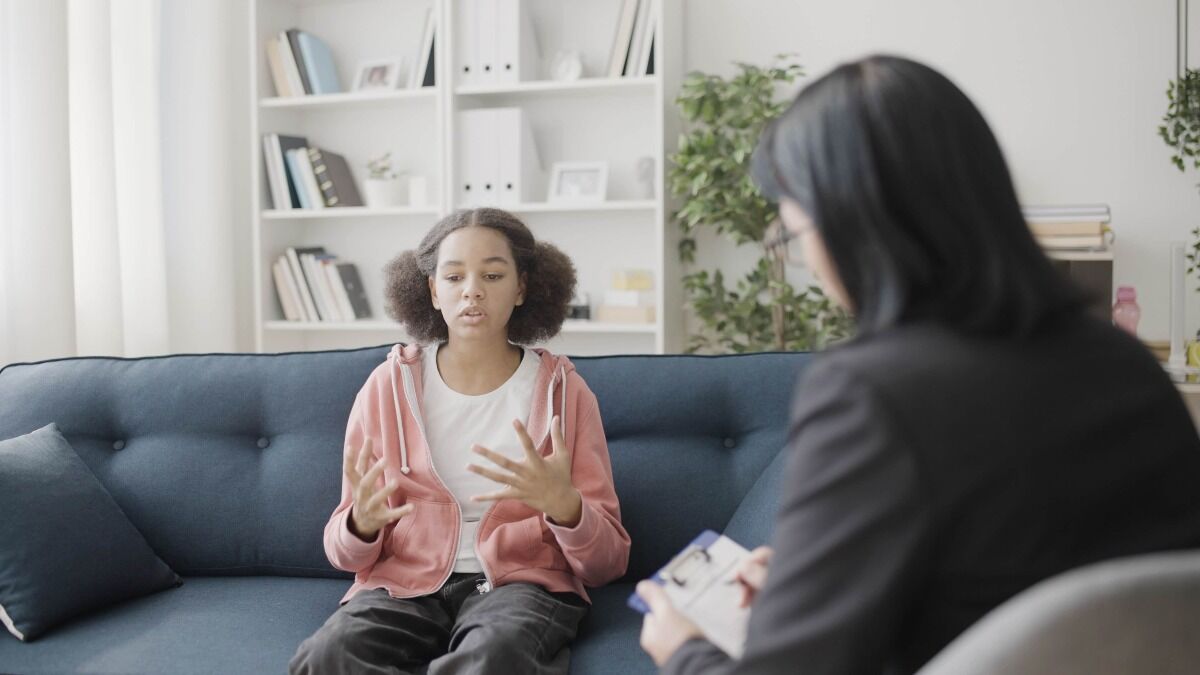Wondering how to talk to parents about mental health? Speaking with family members about your mental health struggles can be a little intimidating, but it’s a great first step to getting help. When you bring your mental health to your parents’ attention, they can help you find a youth therapist to address the problem. Find advice for how to talk to parents about mental health below.
If you or someone you know is experiencing a mental health emergency, please contact the Colorado Crisis Line at 1-844-493-8255 for immediate support.
My Parents Don’t Understand My Mental Health
A lot of people feel like their parents don’t understand their mental health, and sometimes they’re right. Sometimes mental health struggles feel like they should be super obvious to everyone around you, but not everyone knows what’s going on inside your mind. You may try to drop hints, but the best way to get the message to your parents is to have an open, honest conversation. Communicating your experience and your needs provides a path to getting effective support through therapy.
My Parents Don’t Take My Mental Health Seriously
Not everyone feels completely safe sharing information about mental health with their parents. Sometimes things like gender identity, culture, or other factors can make conversations more complicated depending on your family’s beliefs or values. Only share details you’re comfortable sharing. If necessary, focus more on the goal of getting professional help. Once you get connected with a youth therapist, they can help you navigate other conversations safely. Conversations with your therapist are completely private and do not get shared with parents, unless there is concern for your safety or the safety of others.

How to Talk to Parents About Mental Health: Things to Consider
When looking at how to talk to parents about mental health, consider these tips to help navigate the conversation. Remember, chances are, your parents want to help and support you in any way they can. So, take the leap and ask for that support. However, sometimes it’s comforting to make a plan. Use these steps as a guide to talk to your parents about mental health:
Talk to Someone You Trust
Organize Your Thoughts
Choose the Time Wisely
Speak Honestly and Avoid Criticism
Make Some Suggestions
Give it Time, Then Follow Up
Talk to Someone You Trust
If there is an adult or friend in your life that you trust and respect, start there. It’s good to bounce things off someone who you know supports you. They can also help you figure out the best way to approach a conversation with a parent. A guidance counselor or school therapist can even help you through the process and provide some professional recommendations.
Organize Your Thoughts
Having a vulnerable conversation about mental health with a parent can be intimidating. If you’re nervous to bring things up with your parent, don’t be afraid to sit down and write some bullet points or journal about it. You’re not obligated to share every detail of your experience with a parent; sometimes it feels better to save certain information for a therapist. Take some time beforehand to identify what you want to share and the desired outcome of the conversation. If it feels more comfortable, you can always write a letter to your parent and give it to them. Then, they can read it and approach you to follow up and take action.
Choose a Good Time
It’s always a good idea to choose a time for big conversations. Make sure your parent has the time to sit down and have a full discussion with you without interruption. You should also give yourself the time to decompress after the conversation too. That means the car ride to school or practice may not be the best time. Consider a weekend or a calmer evening after school/work. You can start things off with, “Can I talk to you about something?” Then, they can say whether they’re prepared for a conversation.
Speak Honestly and Avoid Criticism
When it’s time to have the conversation, speak honestly and from the heart. Your parent may have follow-up questions, and you can answer them in as much detail as you’re comfortable with. It’s important to note, starting with an accusation rarely brings out the best in another person. Try to approach things with a goal of mutual understanding. Try to describe how you feel and explain that you want to get help from a professional.
Make Some Suggestions
The conversation should come with some suggestions to get help. The best way to support your mental health is to work with a youth therapist, so you can suggest this as a solution in your conversation. You can even provide resources to find a therapist through Mindhues or even your school counselor. Then, your parent can help you find a great provider.

Give it Time, Then Follow Up
Once you’ve talked it out, give the conversation some time to breath, but make sure it remains a priority. If you notice nothing happens in a week or so, follow up with your parent and ask if they can make a call. You can also share this link with your parents so they can quickly find youth therapists who align with your needs.
How to Talk to Parents About Mental Health
If you’re wondering how to talk to parents about mental health, you are not alone. Young people around the world struggle with their mental health – but there are so many resources and specialized therapists that can help you navigate it. You just need to speak up and advocate for yourself. Having a mental health professional on your side can transform your experience and provide a path to getting better.
Mindhues can connect you with specialized youth therapists easily. Have your parents complete our contact form to get started and schedule your session. Once you make an appointment, your therapist will send you information to join the meeting from your computer, tablet, or phone.
Can I Enroll Myself in Therapy?
If you are under the age of 18 and want to find an ongoing therapist, you need to get your parents involved. They can help find the right youth therapist and create a plan. However, Colorado offers a state-funded program called I Matter, which offers up to six free mental health therapy sessions for youth up to age 18. Youth age 11 and younger need a parent to register with them. However, if you are over the age of 12, you can enroll yourself in therapy through iMatter in the state of Colorado on your own.. If you are over the age of 12, you can enroll yourself in therapy through I Matter in the state of Colorado. Get more information about I Matter at imattercolorado.org.
Find Your Therapist Through Mindhues
Looking for a youth therapist to start your journey to better mental health? Mindhues can help. We connect young people with qualified youth therapists to treat and overcome mental health struggles. Contact us to start the process today.




